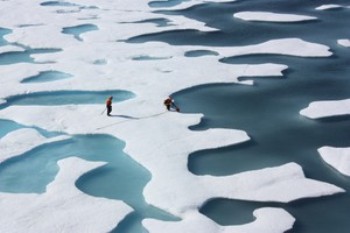New research conducted at the University of Washington indicates that even when all the polar sea ice on Earth melts due to warming climate it could recover if the global temperatures come down again. Though the finding that a threshold warm temperature or “tipping point” does not exist is good news, the increase in greenhouse gases raises concern.
 NASA Freshwater ponds appear atop the Arctic ice cap during the summer melt in this image taken on July 12. The NASA-funded Impacts of Climate on Ecosystems and Chemistry of the Arctic Pacific Environment project has been examining the ponds and the ice around them this summer.
NASA Freshwater ponds appear atop the Arctic ice cap during the summer melt in this image taken on July 12. The NASA-funded Impacts of Climate on Ecosystems and Chemistry of the Arctic Pacific Environment project has been examining the ponds and the ice around them this summer.
Scientists have been monitoring the decreasing sea ice-covered area in the Arctic during the warm summer months. In this research, they used a computer-generated climate model that could reflect the loss rate of the sea ice. The global model was highly sensitive to warming and projected that the September Arctic sea ice would be lost by the middle part of the century. According to the model, all of the winter sea ice would be lost in a couple of more centuries, and for that to occur the carbon dioxide levels have to rise to a level nine times higher than the current levels. And when the carbon dioxide levels were gradually decreased the temperature came down and the sea ice came back.
The high level of carbon dioxide made the planet 6°C (11°F) warmer than the current temperatures. This caused a complete sea ice-free winter in the Arctic.
The research model initially had an atmospheric carbon dioxide level of 355 ppm. The carbon dioxide level was increased by 1% annually. This led to doubling of greenhouse gas levels every 70 years or so. According to the model, the planet became free of winter sea ice in about 230 years, at which time the atmospheric carbon dioxide level was over 3,100 ppm.
The scientists then reduced the level of carbon dioxide by 1% every year till the Earth’s temperature reached current levels. Such actual reduction would require carbon dioxide to be drawn out from the atmosphere in addition to limiting usage of fossil fuels.
But, as long as the warmth of the Earth continues to rise the sea ice cover will continue to shrink.
Source: http://www.washington.edu/